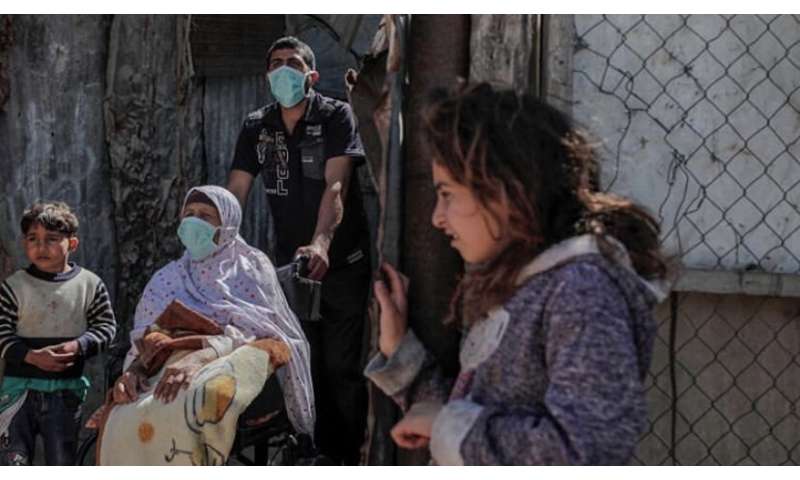New project to assess community responses to COVID-19 in Gaza refugee camps

A rapid research project will launch this week—during Refugee Week 2020—to assess some of the immediate impacts of COVID-19 for refugee communities living in camps in the Gaza Strip.
The four-month project, led by Dr. Jason Hart and Dr. Luisa Enria from the University of Bath's Centre for Development Studies with Dr. Caitlin Procter from the European University Institute in Florence, seeks to better understand the barriers and enablers that stand in the way of public health messaging being applied within refugee camps.
The Gaza Strip is home to a population of approximately 1.9 million people, including around 1.4 million Palestinian refugees. Almost 600,000 Palestinian refugees in Gaza live in the eight recognized Palestine camps.
For this population, COVID-19 presents unique and acute challenges in terms of access to healthcare, key resources and utilities.
For example, as part of the scoping for the work, the researchers learnt that face masks were regularly shared by up to 15 members of the same family (rotating usage of the mask for an hour each per day); that regular hand washing is severely hampered by limited access to water; and that some families have moved in together to care for the sick, increasing the numbers of people already living in one household.
Compounding these issues, the health sector in Gaza has been severely impacted by the blockade in place since 2007. This had already severely undermined basic hygiene, evident in the shortage of water and sewage treatment facilities, but now further hampers efforts to prevent the virus' spread.
Access to clean water and electricity remains at crisis level and clean water is unavailable for 95 per cent of the population.
On top of this, ongoing power shortages have severely impacted the availability of essential services, particularly health, water and sanitation services. Very limited medical supplies are allowed to enter Gaza, and there are only 70 ICU beds across the entire territory.
As of the 10 June, there were 72 confirmed cases of COVID-19 in Gaza according to the World Health Organisation. However, given the limited capacity for testing in Gaza, the actual number of cases is thought to be significantly higher. When the first case was detected, the entire Gaza Strip was placed under an initial two-week quarantine by the Hamas government, which has been extended since.
Through a series of qualitative interviews, conducted remotely via Skype and other online platforms, the researchers seek to hear from those living in camps about how public health measures have been received and what the community response has been. It builds on work conducted by Dr. Enria in Sierra Leone at the time of Ebola.
The key question they hope to better understand is how communications about the crisis is filtering down to those living in camps and, more broadly, how public health information and misinformation spreads and is propagated.
Dr. Hart explained: "This project seeks to address the current lack of an evidence base on how refugee camp communities are responding to public health directives established in response to COVID-19 in Gaza."
Dr. Procter noted: "We need insight into the consequences of a 'stay at home' message in overcrowded communities already under threat of on-going conflict related violence and economic strain. In these communities, where clean water supplies are severely limited, public health directives and policies around social/physical distancing, self-isolation and quarantine, as well as a 'no-touch' policy and the need for regular hand washing can lead to significant social disruption."
Dr. Enria added: "Drawing on my experience from previous epidemics in humanitarian settings, we know that community buy-in to public health measures is critical to curbing the rate of virus transmission. For this to be possible however, and given the fragile situation before the outbreak, local practices and beliefs must be taken into consideration.
"Further, from the outset of a crisis, the broader protection concerns that can arise as a result of these public health measures must be understood, so that they can be mitigated to the greatest extent possible."
The research proposal has been developed with the support and coordination of the United Nations Relief and Works Agency (UNRWA): the main health, education and sanitation service provider in the camps.
The work is funded by ELRHA and the UK's Department for International Development.
The full research team involves Dr. Luigi Achilli, EUI; Dr. Nur Abdelkhaliq Zamora, IOD PARC; Dr. Mohammed Al-Rozzi, University of Edinburgh; Christina Torsein, Proteknon.
It is designed to contribute directly to UNRWA communications with communities and UNRWA's protection activities during the pandemic.
This study will be conducted with Palestinian refugees in all eight refugee camps in Gaza: Shati, Jabalia, Burj al Buraj, Nuseirat, Rafah, Khan Younis, Deir el Balah and Maghazi Camp.
Provided by University of Bath